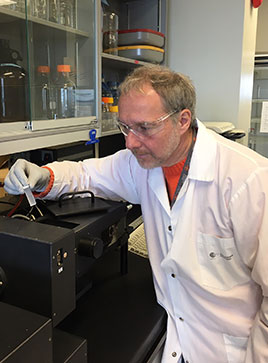COVID-19

Slow and steady wins the race: Why developing a vaccine against COVID-19 will take time

As the fight against COVID-19 leads to lockdowns and physical distancing measures to slow the spread of disease, many people are wondering when things will get back to “normal.” In order to reach this, leaders around the world have highlighted the need for scientists to develop an effective vaccine—but it is not as easy as it seems.
To stop COVID-19, an effective vaccine will need to trigger an immune response that focuses specifically on SARS-CoV-2, the virus that causes the disease. Dr. Denis Leclerc, a full professor in the Department of Infectiology, Microbiology, and Immunology at Université Laval, is leading research in this analysis and compares it to finding the pathogen’s Achilles heel.
Dr. Leclerc’s research is divided into two main studies. With the first study, he has developed a nanoparticle that has the potential to bond with the virus and trigger a general immune response that will motivate the immune system to attack the virus before it can infect cells. He is currently working to determine an area of the virus that will accept this bond.
In his second study, Dr. Leclerc is analyzing whether the body’s production of neutralizing antibodies can stimulate the immune system to prevent SARS-CoV-2 from penetrating the surface of cells and cause the infection.
Components from both projects will help Dr. Leclerc realize his goal of creating the most robust vaccine that will prevent COVID-19.
While his research is promising, Dr. Leclerc cautions that more work needs to be done before an effective vaccine can be created for human clinical trials against this pandemic. He believes that this success will be achieved through collaboration.
“My team is working full time with Canadian researchers from other labs to try and develop a vaccine that will work against COVID-19,” says Dr. Leclerc. “We will then be able to translate these findings to other national and international researchers by early November so that clinical trials of vaccines can be developed for Canadian patients. That way, in about a year-and-a-half, a collaborative solution to this pandemic will effectively save lives.”
- Date modified: